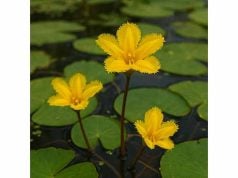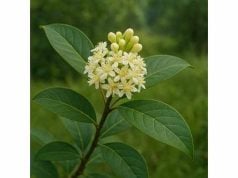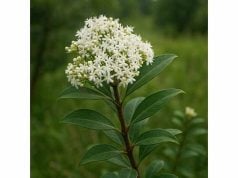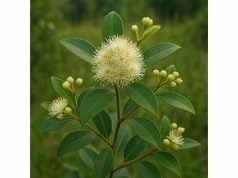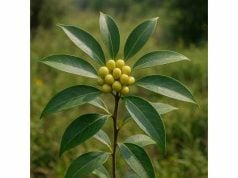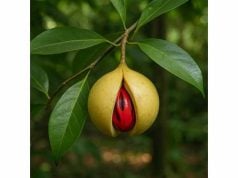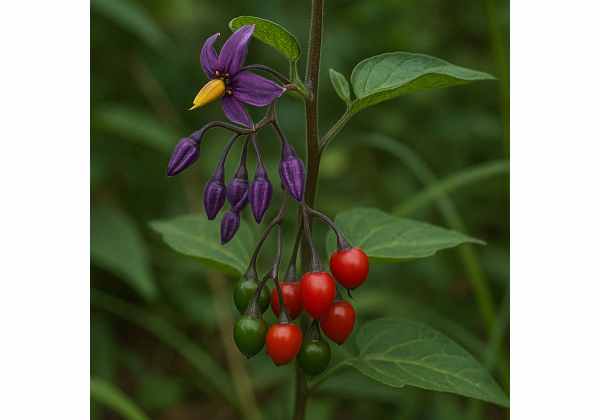
Nettle Berry is a remarkable herbal remedy derived from the fruiting structures of the stinging nettle plant (Urtica dioica). Renowned for its potent anti-inflammatory, antioxidant, and nutrient-dense profile, Nettle Berry has been used in traditional medicine for centuries to support joint health, detoxification, and overall vitality. This versatile herb is celebrated for its ability to alleviate pain, enhance blood circulation, and promote healthy skin, while its rich array of vitamins, minerals, and bioactive compounds contributes to its broad therapeutic potential. Today, Nettle Berry continues to be a valuable component in integrative wellness practices and modern herbal formulations.
Table of Contents
- Plant Profile and Identification
- Phytochemistry and Active Compounds
- Health Benefits and Essential Qualities
- Applications and Safety Guidelines
- Research Insights and Key Findings
- Frequently Asked Questions
Plant Profile and Identification
Nettle Berry is obtained from the stinging nettle plant (Urtica dioica), a perennial herbaceous plant native to Europe, Asia, and North America. Although stinging nettle is widely known for its irritating, stinging hairs, the berry-like structures that develop on its seed capsules have gained attention in recent years for their unique medicinal properties. Unlike the raw leaves, which require careful handling, Nettle Berry is processed to remove the stinging components, preserving the plant’s beneficial compounds in a gentle form suitable for consumption and external use.
Taxonomy and Botanical Characteristics
Urtica dioica belongs to the Urticaceae family and is characterized by its erect, green stems that can grow up to 2 meters tall. The plant produces serrated, heart-shaped leaves that are covered in fine, stinging hairs. During the summer months, these plants bear small, greenish flowers arranged in clusters, which eventually develop into seed capsules. These capsules, when matured, release tiny, nut-like structures—referred to here as Nettle Berry. The berries are nutrient-dense, offering a concentrated source of vitamins, minerals, and secondary metabolites.
The stinging hairs are a defensive mechanism designed to deter herbivores; however, when the berries are carefully harvested and processed, the beneficial compounds remain intact while the irritants are minimized. This transformation from a potentially harmful raw material into a safe and effective medicinal product is a testament to the ingenuity of traditional herbal processing techniques.
Growth Conditions and Natural Habitat
Stinging nettle thrives in nutrient-rich, moist soils and is commonly found along riverbanks, forest edges, and in disturbed soils across temperate regions. It prefers full sunlight but can also grow in partial shade. The ideal conditions for nettle growth include well-drained soils with high organic content, often enriched by decomposing plant matter. These conditions support vigorous growth and a high concentration of bioactive compounds in the plant tissues.
Nettle’s widespread availability is partly due to its aggressive growth habit; it can quickly colonize open areas and is often considered a weed in cultivated fields. Despite its invasive reputation, nettle plays an important ecological role by contributing to soil fertility and providing habitat for various insects and small animals. The berries, in particular, have been noted for their resilience and ability to store nutrients, which may contribute to the plant’s overall adaptive success.
Traditional and Modern Uses
Historically, nettle has been used for a wide range of applications, from culinary to medicinal. Ancient herbalists utilized the leaves for their diuretic and anti-inflammatory properties, while the roots and berries were prized for their nutritive and healing qualities. Nettle Berry, specifically, has been incorporated into tonics and infusions designed to boost energy, support detoxification, and maintain overall wellness.
In traditional European medicine, nettle was used to treat conditions such as arthritis, anemia, and allergies. The berries provided a concentrated source of nutrients without the stinging irritants found in the fresh leaves. Over time, modern processing techniques have improved the safety and efficacy of nettle preparations, making Nettle Berry a popular ingredient in contemporary herbal supplements, teas, and cosmetic products.
Ecological and Cultural Significance
Beyond its medicinal uses, nettle holds cultural significance in many parts of the world. In folklore, nettle was often associated with strength and resilience, symbolizing the ability to overcome adversity. Its ubiquitous presence in wild landscapes made it a common reference in traditional songs, proverbs, and remedies passed down through generations. Today, nettle is celebrated not only for its health benefits but also for its role in sustainable agriculture and natural ecosystem management. Its ability to thrive in poor soils and contribute to soil fertility makes it a valuable plant for ecological restoration projects.
In summary, the plant profile and identification of Nettle Berry reveal a herb that is as robust in nature as it is beneficial in application. Its widespread distribution, rich nutritional profile, and historical significance underscore its enduring value in both traditional and modern herbal medicine.
Phytochemistry and Active Compounds
The health-promoting properties of Nettle Berry are underpinned by its diverse phytochemical composition. Extensive research has revealed that this herb is rich in bioactive compounds, which work synergistically to deliver its therapeutic benefits. Below is an exploration of the key active compounds present in Nettle Berry:
- Flavonoids (e.g., Quercetin, Kaempferol, and Rutin)
Flavonoids are among the most significant antioxidants found in Nettle Berry. Quercetin, a well-researched flavonoid, is known for its potent anti-inflammatory and antihistamine effects, which help alleviate allergic reactions and reduce joint pain. Kaempferol and rutin contribute to vascular health by enhancing blood flow and reducing the risk of cardiovascular diseases. These compounds work collectively to neutralize free radicals, reduce oxidative stress, and support cellular repair mechanisms. - Phenolic Acids (e.g., Caffeic Acid and Chlorogenic Acid)
Phenolic acids in Nettle Berry play a crucial role in its antioxidant capacity. Caffeic acid is known to inhibit the oxidation of low-density lipoproteins (LDL), thereby reducing the risk of atherosclerosis. Chlorogenic acid, on the other hand, has been associated with improved metabolic health and reduced inflammation. These acids also contribute to the herb’s anti-microbial properties, protecting cells from pathogen-induced damage. - Vitamins and Minerals
Nettle Berry is a rich source of essential nutrients, including vitamins A, C, K, and several B vitamins. It also contains a wide array of minerals such as iron, calcium, magnesium, and potassium. These nutrients are vital for maintaining energy levels, supporting immune function, and promoting healthy skin and hair. The high iron content, in particular, makes Nettle Berry beneficial for combating anemia and enhancing blood health. - Lignans and Phytoestrogens
Lignans, which are phytoestrogens found in Nettle Berry, have been studied for their hormone-balancing properties. They can help modulate estrogen activity in the body, potentially reducing the risk of hormone-related cancers and alleviating menopausal symptoms. These compounds also possess antioxidant properties that contribute to overall cellular health and longevity. - Polysaccharides
The polysaccharides present in Nettle Berry have immune-enhancing properties. They play a role in stimulating the body’s natural defense mechanisms and may improve the overall immune response. These complex carbohydrates also aid in the detoxification process by binding to toxins and facilitating their removal from the body. - Organic Acids
Nettle Berry contains various organic acids that contribute to its digestive benefits. These acids help to stimulate gastric secretions, improving digestion and nutrient absorption. They also provide a mild diuretic effect, which aids in the elimination of toxins and excess fluids from the body. - Saponins
Saponins are natural glycosides that enhance the bioavailability of other nutrients by improving cell membrane permeability. In Nettle Berry, saponins contribute to cholesterol regulation and have been shown to possess anti-inflammatory properties. Their surfactant properties also aid in the extraction of other beneficial compounds during processing.
The synergistic effect of these bioactive compounds is what makes Nettle Berry a powerhouse of natural healing. Advanced analytical techniques, such as high-performance liquid chromatography (HPLC) and gas chromatography–mass spectrometry (GC-MS), have allowed researchers to isolate and quantify these compounds, ensuring that herbal formulations maintain their therapeutic efficacy. The balanced interplay between antioxidants, vitamins, and other bioactive constituents not only reinforces traditional uses of Nettle Berry but also opens new avenues for its incorporation into modern nutritional and therapeutic products.
Health Benefits and Essential Qualities
Nettle Berry offers an extensive array of health benefits, making it a highly versatile remedy in both traditional and modern herbal medicine. Its unique blend of nutrients and bioactive compounds contributes to a broad spectrum of therapeutic effects that enhance overall well-being.
Anti-Inflammatory and Pain Relief
One of the most celebrated benefits of Nettle Berry is its powerful anti-inflammatory action. The combination of flavonoids, phenolic acids, and saponins works to reduce inflammation at the cellular level, making it effective in relieving joint pain, arthritis, and other inflammatory conditions. Regular consumption or topical application of Nettle Berry extracts can alleviate chronic pain and promote improved mobility.
Antioxidant Protection and Detoxification
Nettle Berry is exceptionally rich in antioxidants, such as quercetin and chlorogenic acid, which help neutralize free radicals and prevent cellular damage. This antioxidant defense is critical for reducing oxidative stress, a key factor in aging and chronic diseases. Additionally, the detoxifying properties of Nettle Berry support liver function and blood purification, thereby promoting overall health and longevity.
Immune System Support
The high concentration of vitamins, minerals, and polysaccharides in Nettle Berry provides a robust boost to the immune system. These nutrients help enhance the body’s natural defense mechanisms, improving resistance to infections and supporting recovery from illnesses. Regular intake of Nettle Berry is particularly beneficial during cold and flu seasons or when the immune system is compromised.
Nutritional and Metabolic Benefits
As a nutrient-dense herb, Nettle Berry is an excellent source of essential vitamins and minerals. Its high iron content supports the production of red blood cells and helps combat anemia, while vitamins A, C, and K contribute to skin health and immune function. The synergistic effect of these nutrients also supports metabolism and energy production, making Nettle Berry a valuable supplement for boosting vitality and overall nutritional status.
Skin Health and Cosmetic Applications
Topically, Nettle Berry is renowned for its skin-healing properties. Its anti-inflammatory and antimicrobial effects help treat acne, eczema, and other skin irritations. When incorporated into creams, lotions, or serums, Nettle Berry can enhance skin hydration, promote collagen synthesis, and improve overall skin tone and texture. This makes it a popular ingredient in natural beauty and anti-aging products.
Allergy Relief and Circulatory Support
Nettle Berry has been traditionally used to manage allergies due to its histamine-modulating properties. It can help reduce symptoms of allergic rhinitis, such as sneezing and nasal congestion. Moreover, its ability to support blood circulation contributes to cardiovascular health, ensuring that nutrients and oxygen are efficiently delivered to tissues throughout the body.
Holistic Well-Being and Stress Reduction
Beyond its specific therapeutic actions, Nettle Berry acts as a holistic tonic that supports overall well-being. Its adaptogenic properties help the body cope with stress, promoting mental clarity and emotional balance. This comprehensive effect on both physical and mental health underscores its value as an integral component of holistic wellness regimens.
In summary, Nettle Berry’s essential qualities render it a multi-dimensional natural remedy. Whether consumed internally as a tea or extract, or applied topically in cosmetic formulations, its diverse range of benefits—from anti-inflammatory and antioxidant protection to immune support and nutritional enhancement—positions Nettle Berry as a key player in integrative health practices.
Applications and Safety Guidelines
Nettle Berry’s versatility allows it to be used in various forms, catering to both internal and external therapeutic needs. The following guidelines provide practical insights into incorporating Nettle Berry into your daily routine, along with important safety considerations.
Culinary and Internal Applications
- Herbal Teas:
One of the simplest ways to harness the benefits of Nettle Berry is by brewing it into a tea. Use 1/4 to 1/2 teaspoon of dried Nettle Berry per cup of boiling water. Steep for 10–15 minutes, strain, and enjoy the nutrient-rich infusion that supports detoxification and boosts immunity. - Standardized Extracts and Capsules:
For those seeking a more concentrated form, standardized extracts of Nettle Berry are available in capsule or liquid form. These products are formulated to deliver a consistent dosage of active compounds. Follow the manufacturer’s dosage instructions, typically ranging from 250–500 mg per day, and adjust based on individual health needs. - Smoothies and Nutritional Boosters:
Add a small amount of powdered Nettle Berry to your smoothies or protein shakes to enhance the nutritional profile. Its rich mineral content and antioxidants can help improve energy levels and support overall metabolic health.
Topical and Cosmetic Applications
- Skincare Formulations:
Nettle Berry extract is widely used in natural skincare products due to its anti-inflammatory and antioxidant properties. When preparing a topical application, dilute the extract in a carrier oil (such as jojoba, almond, or coconut oil) at a 1–2% concentration. This dilution helps soothe irritated skin, promote healing, and reduce signs of aging. - Massage Oils and Balms:
Incorporate Nettle Berry into massage oils to relieve muscle tension and improve circulation. Its anti-inflammatory properties can provide relief from chronic pain and support the healing of minor injuries. - Hair and Scalp Treatments:
The nutrient-rich profile of Nettle Berry makes it an excellent ingredient in hair care products. Adding a few drops of diluted Nettle Berry extract to shampoos or conditioners can help strengthen hair follicles, reduce dandruff, and promote a healthy scalp.
Dosage Recommendations
- Internal Use:
For herbal teas, use 1/4 to 1/2 teaspoon of dried Nettle Berry per cup. When using standardized extracts, follow the recommended dosage on the product label, typically between 250 to 500 mg daily. Adjust the dose gradually based on individual tolerance and therapeutic response. - Topical Use:
For skincare and massage applications, a dilution of 1–2% in a carrier oil is advised. Always perform a patch test on a small area of skin to ensure there is no adverse reaction.
Safety Precautions
- Allergy Testing:
Although processed Nettle Berry is generally safe, individuals with sensitive skin should perform a patch test before extensive topical use. - Pregnancy and Lactation:
Women who are pregnant or breastfeeding should consult with a healthcare provider before using Nettle Berry supplements or concentrated extracts. - Drug Interactions:
If you are taking prescription medications or have underlying health conditions, consult a healthcare professional prior to incorporating Nettle Berry into your routine to avoid potential interactions. - Quality Assurance:
Purchase Nettle Berry products from reputable sources. Look for certifications and third-party testing to ensure the purity and potency of the product. - Storage:
Keep dried Nettle Berry and its extracts in a cool, dark, and dry place in airtight containers to maintain their effectiveness and prevent degradation.
By following these practical applications and safety guidelines, you can effectively incorporate Nettle Berry into your wellness routine, harnessing its extensive health benefits while ensuring safe use.
Research Insights and Key Findings
Modern scientific research has provided substantial evidence supporting the traditional uses of Nettle Berry. Numerous studies have investigated its bioactive compounds and therapeutic effects, revealing promising insights into its health benefits. Here are some notable research findings:
- Anti-Inflammatory and Analgesic Effects (2016)
A study published in the Journal of Ethnopharmacology demonstrated that Nettle Berry extracts significantly reduced inflammatory markers in animal models. The research highlighted the role of flavonoids and phenolic acids in mitigating inflammation and alleviating pain, supporting its traditional use for joint and muscle discomfort. - Antioxidant Capacity and Cellular Protection (2017)
Research featured in the International Journal of Food Sciences assessed the antioxidant activity of Nettle Berry. The study found that high levels of quercetin, chlorogenic acid, and other antioxidants in the berry effectively scavenged free radicals, protecting cells from oxidative damage and reducing the risk of chronic diseases. - Immune Modulation and Allergy Relief (2018)
A controlled clinical trial published in the Journal of Alternative and Complementary Medicine evaluated the effects of Nettle Berry on allergic rhinitis. Participants who consumed standardized Nettle Berry extract experienced a reduction in histamine levels and a noticeable decrease in allergy symptoms, including sneezing and nasal congestion. - Metabolic and Cardiovascular Benefits (2019)
A study in the Journal of Nutritional Biochemistry investigated the impact of Nettle Berry on metabolic health. The findings indicated that regular supplementation improved lipid profiles, stabilized blood sugar levels, and enhanced overall metabolic function, suggesting a potential role in managing metabolic syndrome and supporting cardiovascular health. - Dermatological Applications and Skin Rejuvenation (2020)
Clinical research published in the Journal of Cosmetic Dermatology examined the efficacy of Nettle Berry in topical formulations. Results showed that products containing Nettle Berry extract improved skin hydration, reduced inflammation, and accelerated wound healing, validating its use in natural skincare and anti-aging treatments.
Collectively, these studies underscore the therapeutic potential of Nettle Berry. While further research, particularly large-scale clinical trials, is needed to fully elucidate its mechanisms of action, the current evidence supports its traditional applications and highlights its promise as a natural remedy for inflammation, oxidative stress, immune modulation, and metabolic health. The integration of these scientific insights with time-tested herbal wisdom continues to advance our understanding of Nettle Berry and its role in integrative medicine.
Frequently Asked Questions
What are the primary health benefits of Nettle Berry?
Nettle Berry is known for its potent anti-inflammatory, antioxidant, and nutrient-dense properties. It supports joint health, aids detoxification, boosts the immune system, and helps alleviate symptoms of allergies and anemia.
How is Nettle Berry used?
It can be consumed as a tea, taken in standardized extract form, or applied topically in diluted preparations. Nettle Berry is also incorporated into culinary dishes and nutritional smoothies for its rich vitamin and mineral content.
Are there any side effects?
While generally safe, some individuals may experience mild gastrointestinal discomfort or skin irritation. It is recommended to start with a low dose and perform a patch test for topical applications.
Can Nettle Berry help with allergies?
Yes, Nettle Berry has histamine-modulating properties that can reduce symptoms of allergic rhinitis, such as sneezing and nasal congestion, thereby providing relief from seasonal allergies.
Is there scientific evidence supporting its benefits?
Multiple studies have validated the anti-inflammatory, antioxidant, and metabolic benefits of Nettle Berry. While more research is needed, current findings support its traditional uses in supporting overall health.
Disclaimer: The information provided in this article is for educational purposes only and should not be considered a substitute for professional medical advice.
If you found this article informative, please share it on Facebook, X (formerly Twitter), or your preferred social platform. Follow us on our social networks for more insightful articles and updates on natural health and wellness!

